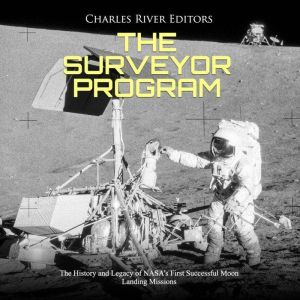

List: $6.95
| Sale: $4.87
Club: $3.47
The Surveyor Program: The History and Legacy of NASA's First Successful Moon Landing Missions
Author: Charles River Editors
Narrator: Daniel Houle
Unabridged: 2 hr 7 min
Format: Digital Audiobook Download
Publisher: Charles River Editors
Published: 04/07/2020
Categories: Nonfiction, History, Us History, Modern History
Synopsis
The Apollo space program is the most famous and celebrated in American history, but the first successful landing of men on the Moon during Apollo 11 had complicated roots dating back over a decade, and it also involved one of NASA’s most infamous tragedies. Landing on the Moon presented an ideal goal all on its own, but the government’s urgency in designing the Apollo program was actually brought about by the Soviet Union, which spent much of the 1950s leaving the United States in its dust (and rocket fuel). In 1957, at a time when people were concerned about communism and nuclear war, many Americans were dismayed by news that the Soviet Union was successfully launching satellites into orbit. Throughout the 1960s, NASA would spend tens of billions on missions to the Moon, the most expensive peacetime program in American history to that point, and Apollo was only made possible by the tests conducted through the Surveyor Program. Between May 1966 and January 1968, the Surveyor Program launched seven unmanned spacecraft to the lunar surface to gather data and test the feasibility of landing a manned vehicle on the Moon. Although largely forgotten now, without these missions the later series of manned Moon landings would not have been possible. The Surveyor Program: The History and Legacy of NASA’s First Successful Moon Landing Missions examines the origins behind the missions, the space probes involved, and the historic results.